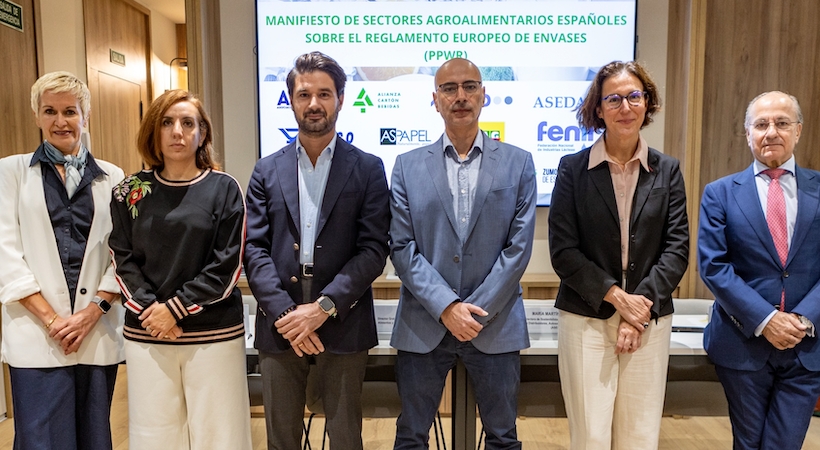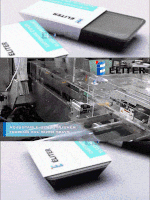The signatory Spanish agri-food sectors urge the Spanish Presidency for greater legal and food security in the future Packaging Regulation
2024-04-06

- It is urged to make packaging reuse objectives more flexible to preserve food safety, minimize health risks and reduce waste.
- It is proposed to opt for plant-based plastics to achieve recycled content targets and bridge the shortage in the recycled plastic market.
- A flexible regulatory framework is required that provides greater legal security for the industry and makes it possible to undertake long-term investments.
The Spanish agri-food sectors that signed the manifesto, which include eleven organizations of farmers, ranchers, producers, packers, distribution and catering industries, as well as recyclers, urge the Spanish Presidency in the EU to preserve legal and food security in the future European Packaging and Waste Packaging Regulation (PPWR). They ask that the measures implemented safeguard the safety and quality of agri-food products distributed and exported in Spain, as well as guarantee greater legal certainty so that companies in the Spanish agri-food sector can progressively adapt to the reuse, collection and recycling objectives of the future Regulation. European Packaging.
Reuse targets must be flexible so as not to compromise food safety and quality
In recent years, the agri-food industry has developed efforts to guarantee best practices in terms of the circular economy, such as the reduction of plastics or the replacement of materials with recyclable ones. However, the signatory organizations agree that the new legislation should not only encourage solutions that contribute to minimizing the impact of agri-food packaging on the environment, but also guarantee that the objectives of the Regulation protect quality, food safety and health, and the availability of food everywhere as established by the European Farm to Fork Strategy.

In this sense, when establishing objectives for the reuse of food packaging, the signatory organizations of the manifesto ask for an in-depth review of the different functionalities of packaging and food, contemplating the necessary exemptions to preserve food safety, minimize risks for health and reduce food waste. They also point out that this change in the production model would have a series of economic and logistical implications, also leading, for example, to an increase in the carbon and water footprint when compared with the current collection and recycling system , since the new reuse obligations They would involve the implementation of – among others – new washing, refrigeration and transportation systems.
Plant-based plastic can help achieve the recycled content goal in the face of a shortage of recycled plastic that is not provided for in the regulation
Likewise, the signatory agri-food organizations ask to consider technological neutrality when meeting recycled content objectives, with alternatives such as plant-based plastics. The proposal for a regulation presented by the Commission sets minimum recycled content targets for plastic packaging of up to 50% in 2040, but does not contemplate measures to ensure recycled plastic for food use is available at a competitive price.
Companies face new costs, operational changes and investments that require legal certainty and a regulatory framework that facilitates this transition.
Finally, given the serious inflationary period and the efforts already undertaken by the agri-food sector to comply with all legislation on circular economy, such as the implementation of the European Single-Use Plastics Directive or the efforts to achieve the objectives of collection and recycling, the signatory organizations of the manifesto agree in pointing out the need for greater legal certainty in the future Regulation to face new costs, operational changes and investments.
While the signatory organizations of the manifesto support the ambition of the future Regulation to reduce packaging waste and make all packaging recyclable or reusable by 2030, the coalition also considers that, in the upcoming negotiations of the Council of the European Union, they should More flexible objectives should be studied that measure the impact of the measures on the entire value chain of the agri-food sector.
Organizations signatories of the manifesto:
ACES – Association of Spanish Supermarket Chains, ACE – Alliance for Food and Beverage Cardboards for the Environment, AFCO – Spanish Association of Corrugated Cardboard Container and Packaging Manufacturers ANGED – Large National Association of Distribution Companies, ASEDAS – Association Spanish Association of Distributors, Self-Services and Supermarkets, ASPAPEL – Spanish Association of Pulp, Paper and Cardboard Manufacturers, COAG – Coordinator of Farmers and Livestock Organizations, FENIL – National Federation of Dairy Industries, REPACAR – Spanish Association of Recyclers, Paper Recyclers and Cardboard, RESTAURANT BRANDS – Business Association of Restoration Brands – National Association of Juice and Gazpacho Manufacturers – JUMOS Y GAZPACHOS ESPAÑA
Statements from some organizations that signed the manifesto:
Emilio Oviedo, director for Iberia of the Alliance for Food and Beverage Cartons for the Environment (ACE ): “To date, approximately 200 million euros have already been invested to increase the recycling capacity of beverage cartons in the EU and it is planned to invest another 120 million euros by 2027, which makes the Spanish one of the most efficient recycling and collection systems in the world. Simultaneously, investments are being made and will continue to be made over the next five to ten years to further improve the environmental profile of packaging. “Any modification to the current model entails logistical implications that may result in an increase in the ecological footprint of our production.”
Luis Calabozo, general director of the National Federation of Dairy Industries: “Spain is one of the world’s leading producers and exporters of food and beverages, so it must preserve the quality and control of food through its proper use. There are certain non-reusable containers that increase the shelf life of food for weeks and facilitate its conservation and transportation, reducing possible food waste for the distribution channel. For example, aseptic packaging for milk and juice can increase the shelf life of the product for months, saving on refrigeration costs and logistics costs, contributing to the reduction of CO2 emissions. This is especially important for the Spanish agri-food and distribution sector where agri-food exports account for 17.5% of Spanish foreign trade and 11.8% of imports.”
Javier Valle, general secretary of Juices and Gazpachos of Spain: “ Continuing to promote the circular economy and the efficient use of resources is a priority for companies. However, when legislating, it is essential to have solid technical and scientific evidence to justify the measures. For example, in reuse it would be vitally important to analyze the sectoral characteristics, the product and its logistics model. Our product is sensitive to microbiological and environmental factors (light, oxygen,…) and requires measures to guarantee its stability throughout its useful life. Furthermore, as a packaging value chain, intense work is being done on its circularity through different measures such as the incorporation of recycled material, plastic from renewable sources or their lightweighting, turning them into sustainable packaging that achieves high recycling rates.”
María Martínez-Herrera, Director of Sustainability of the Spanish Association of Distributors, Supermarkets and Supermarkets (ASEDAS) : The implications of reusable packaging are enormous and have an impact on the entire Spanish agri-food sector, from the primary sector to the distribution sector. Packaging is essential for food security to exist and access to food in the best conditions to be guaranteed. In this sense, we consider that the use of packaging cannot be modified without an impact study. From distribution we understand that we must continue to advance in decarbonization measures and prevention of the generation of packaging waste and that reuse is an option to achieve these objectives, but before establishing such ambitious reuse objectives we should analyze the function that They meet each container for each product. Not only for the consumer, but also for the distribution sector, offering the agri-food sector sufficient flexibility to be able to choose the most suitable solution that allows that product to reach the consumer in the best conditions and prevent food waste.”




